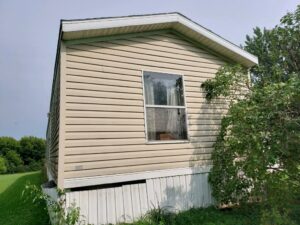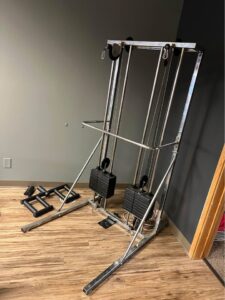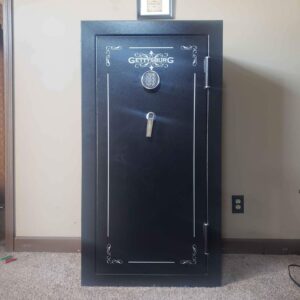Are you considering purchase a mobile home? One of the critical factors you need to think about is its weight capacity. Specifically, you’ll want to know how much weight the floor can hold. This is because mobile homes have a unique structure. Compared to traditional homes the weight capacity of the floor can be limited.
How Much Weight Can a Mobile Home Floor Hold?
The weight capacity of a mobile home floor depends on several factors. This can include the type of materials used, the size of the home, and the placement of the load-bearing walls. Generally, mobile homes are lighter than traditional homes. The floors are designed to support less weight.
However, this doesn’t mean that mobile homes are weak or unsafe. In fact, they are built to strict standards. They are built with regulations to ensure that they are sturdy and durable.
How Are Mobile Home Floors Built Compared to Stick Built Homes
When it comes to building a home, there are two main types of construction: stick-built and manufactured. Stick-built homes are built on-site. While manufactured homes, also known as mobile homes, are built in a factory. They are then transported to their final location and placed together.
The way the floors are built in these two types of homes differs significantly.
In stick-built homes, the floor is typically constructed on-site using a system of joists and beams. The joists are horizontal boards that run perpendicular to the beams. This provides support for the subfloor and any additional flooring layers. The beams, in turn, are vertical supports that run the length of the home. This helps to provide additional support for the joists.
How Much Weight Can A Mobile Home Floor Hold: Steel Frame
In contrast, mobile home floors are built as a single unit in a factory and then transported to the site. The floors are typically made up of a steel frame with cross members for support, and the subfloor is typically made of plywood or particleboard.
One advantage of this type of construction is that it allows for greater consistency in the quality of the materials and the construction process. Because the floors are built in a controlled environment. They are less likely to be affected by weather conditions or other environmental factors that can impact on-site construction.
An Advantage to Lighter Floors
Another advantage of mobile home floors is that they are often designed to be lighter than stick-built floors. This can make them more resistant to damage from earthquakes or other natural disasters.
However, there are also some potential drawbacks to mobile home floors. They are built as a single unit, so they may not be as strong as stick-built floors. This can make them more prone to damage from heavy loads or other stressors.
Overall, the way that mobile home floors are built is different from stick-built homes. While there are some advantages to this type of construction, there are also some potential drawbacks. This should be considered when deciding which type of home to build.

How Much Weight Can a Mobile Home Floor Hold
When it comes to mobile homes, one of the most common questions is how much weight can the floor hold. The answer depends on several factors. Including the size and age of the home. The type of flooring material, and the spacing of the floor joists.
Generally, a mobile home floor can hold between 40 and 50 pounds per square foot (psf). This means that a typical 14′ x 70′ mobile home with a total square footage of 980 square feet can hold up to 39,200 to 49,000 pounds of weight.
Important Weight Limits Mobile Home Floors
However, it’s important to note that this weight limit is for evenly distributed weight. If you place heavy objects in one area of the home it can exceed the weight limit. Items such as gym equipment or aquariums are just to name a few. These items have a large central weight. This can cause damage to the floor.
To ensure that your mobile home floor can hold the weight, it’s recommended to consult with a licensed contractor. They can assess the condition of your home . They can also provide recommendations for any necessary repairs or upgrades.
In addition, it’s important to avoid making any modifications to the home. Do not make modifications that could compromise its structural integrity.
Repairs such as removing load-bearing walls or altering the floor plan. Doing so can increase the risk of damage to the floor and other areas of the home.
Read our article on How to Build a Wall in a Mobile Home for more details.
Overall, it’s important to be mindful of the weight you place on your mobile home floor. This will help to ensure its longevity and safety.
Does the Type of Foundation Help to Support More Weight on a Mobile Home Floor?
When it comes to the weight capacity of a mobile home floor, the type of foundation can play a significant role in determining how much weight it can support. The mobile home foundation is essentially the base on which the entire structure rests, and it is responsible for distributing the weight of the home evenly across the ground.
There are several types of foundations commonly used for mobile homes, including pier and beam, slab, and crawl space. Each type of foundation has its own unique characteristics and advantages, and the weight capacity of a mobile home floor can vary depending on which type of foundation is used.
Pier and beam foundations, for example, are designed to support a significant amount of weight, making them an excellent choice for mobile homes that need to support heavier loads. The weight of the home is distributed across a series of concrete piers, which are spaced evenly throughout the foundation. This helps to prevent the weight of the home from being concentrated in one area, which can cause the floor to sag or even collapse.
Slab Foundations and Weight on a Mobile Home Floor
Slab foundations, on the other hand, are typically less expensive to install than pier and beam foundations, but they may not be as effective at supporting heavy loads. This is because the weight of the home is distributed across a single, solid slab of concrete, which can be more prone to cracking or shifting under the weight of the home.
Crawl space foundations are another option for mobile homes, and they are designed to provide a space underneath the home for ventilation and access to plumbing and electrical systems. While crawl space foundations can be effective at supporting the weight of a mobile home, they may not be the best choice for homes that need to support heavy loads, as the weight of the home is distributed across a series of wooden joists that can be prone to sagging or warping over time.
In summary, the type of foundation used for a mobile home can have a significant impact on its weight capacity. Pier and beam foundations are generally the best choice for homes that need to support heavier loads, while slab and crawl space foundations may be better suited for lighter structures. Ultimately, the weight capacity of a mobile home floor will depend on a variety of factors, including the type of foundation, the materials used in construction, and the overall design of the home.
You might be interested in our article Why is My Ceiling Cracking? This can be caused by your foundation and your mobile home not being level.
Can You Put Heavy Gym Equipment on a Mobile Home Floor?
If you’re a fitness enthusiast, you might be wondering if you can put heavy gym equipment on a mobile home floor. The answer is yes, but it depends on a few factors.

Firstly, you need to know the weight capacity of your mobile home floor. Most mobile homes have a weight capacity of around 40 pounds per square foot. However, this can vary depending on the age and condition of your mobile home.
Secondly, you need to consider the weight of your gym equipment. Most gym equipment is heavy and can easily exceed the weight capacity of your mobile home floor. For instance, a treadmill can weigh between 150 to 200 pounds, while a weight bench can weigh up to 100 pounds.
More on Gym Equipment: How Much Weight Can a Mobile Home Floor Hold
To determine if your gym equipment can be placed on your mobile home floor, you need to calculate the total weight of the equipment and divide it by the square footage of the area where it will be placed. If the weight exceeds the weight capacity of your mobile home floor, then you should avoid placing it there.
However, if you still want to place your gym equipment on your mobile home floor, you can consider using a reinforcement system. This can be done by adding additional floor joists or a subfloor to increase the weight capacity of your mobile home floor.
In summary, you can put heavy gym equipment on a mobile home floor. You will just need to make sure that it doesn’t exceed the weight capacity of your floor. If it does, then you should consider using a reinforcement system. This will help to avoid any potential damage to your mobile home.
Can You Put a Gun Safe on a Mobile Home Floor?
When it comes to placing a gun safe in a mobile home, the first thing you need to consider is the weight of the safe. A typical gun safe can weigh anywhere from 300 to 2,000 pounds. The last thing you want is for it to cause damage to your mobile home floor.

The weight capacity of a mobile home floor varies depending on the specific model and manufacturer. However, most mobile home floors are designed to withstand a certain amount of weight. The average weight capacity of a mobile home floor is around 40 pounds per square foot.
If you want to put a gun safe on a mobile home floor, you need to make sure that the weight of the safe is evenly distributed. This means that you should avoid placing the safe in one spot, as this can cause the floor to buckle or warp.
More on Gun Safes and Mobile Home Floors
To ensure that your gun safe is properly supported, you can use a steel plate or a piece of plywood to distribute the weight evenly. This will help prevent any damage to your mobile home floor.
It’s also important to consider the location of your gun safe. You should avoid placing it near the edge of your mobile home, as this can cause the floor to become unbalanced. Instead, try to place it in the center of the room, where the weight can be evenly distributed.
In conclusion, it is possible to put a gun safe on a mobile home floor, but you need to be careful and take the necessary precautions to avoid damaging your floor. By evenly distributing the weight and placing the safe in a central location, you can ensure that your gun safe is properly supported and your mobile home floor remains intact.
Can a Mobile Home Floor Hold a Fish Tank
If you’re considering adding a fish tank to your mobile home, you may be wondering if your floor can support the weight. Mobile home floors are designed to support the weight of typical furniture and appliances. However, adding a large fish tank can put a significant amount of weight on the floor.

Mobile home floors are typically built with 2×6 or 2×8 joists spaced 16 inches apart. The thickness and spacing of the joists can affect how much weight the floor can hold. Additionally, the type of flooring material can also impact weight capacity.
More On Fish Tanks and Mobile Home Floors
To determine if your mobile home floor can hold a fish tank, you should consult with a professional contractor or structural engineer. They can evaluate your specific mobile home and provide recommendations based on its design and construction.
In general, it’s important to distribute the weight of the fish tank evenly across the floor. Placing the tank near load-bearing walls or support beams can help distribute the weight more evenly. You may also want to consider reinforcing the floor with additional support beams or joists to ensure it can safely support the weight of the fish tank.
How Much Weight Can a Mobile Home Floor Hold: Conclusion
In conclusion, while it’s possible for a mobile home floor to hold a fish tank, it’s important to take precautions and consult with a professional before installation. By taking the necessary steps to ensure your floor can support the weight, you can enjoy your fish tank without worrying about potential damage to your home.
Why Is My Mobile Home Floor Sinking?
If you’re experiencing a sinking floor in your mobile home, there could be several reasons why this is happening. Here are some potential causes:
1. Water Damage
Water damage is one of the most common reasons for a sinking floor in a mobile home. If there has been a leak in your plumbing system or roof, it can cause water damage to the subflooring and weaken the structure. Over time, this can cause the floor to sink or become uneven.
See our article on Water Leak Under a Mobile Home and also Mobile Home Water Shutoff Valve for more information.
2. Poor Installation
If your mobile home is not installed properly, it can cause the floor to sink or become uneven. This is because the weight of the home is not distributed evenly across the foundation. If the piers or support beams are not properly spaced or leveled, it can cause the floor to sink in certain areas.
3. Structural Issues
Structural issues can also cause a sinking floor in a mobile home. This could be due to a variety of factors, including poor design, age, or wear and tear. Over time, the weight of the home can cause the support beams to weaken, which can lead to a sinking floor.
4. Overloading
If you have too much weight on your mobile home floor, it can cause the floor to sink or become uneven. This could be due to heavy furniture, appliances, or even too many people in one area. It’s important to distribute weight evenly across the floor to prevent any damage.
In conclusion, if you’re experiencing a sinking floor in your mobile home, it’s important to identify the cause and address it as soon as possible. This will help prevent any further damage to your home and ensure the safety of you and your family.
How Much Weight Can a Mobile Floor Hold: Final Thought
In conclusion knowing how much weight your mobile home floor can handle is important. Having too much weight on your floor can cause it to sink or cave in. Either way this is an expensive repair to fix. Knowing before hand how much weight my mobile home floor can handle is important for many reasons.
You might also be interested in our article How Long Do Manufactured Homes Last.
FAQ’s: How Much Weight Can a Mobile Home Floor Hold
How much weight can you put on a trailer floor?
The weight capacity of a trailer floor can vary depending on its design and materials. It’s essential to check the manufacturer’s specifications, but many trailer floors can typically support 1,000 to 3,000 pounds per square foot.
Can my floor support 2000 pounds?
Whether your floor can support 2,000 pounds depends on the specific construction and load-bearing capacity of your floor. You should consult an engineer or structural expert to assess your floor’s ability to bear that weight safely.
What is the load capacity of a residential floor?
The load capacity of a residential floor varies, but it’s generally designed to support distributed loads of around 40 to 50 pounds per square foot. However, specific values depend on factors like the floor’s construction and local building codes.
How much weight can a living room floor hold?
A living room floor can typically support the same load capacity as a residential floor, which is around 40 to 50 pounds per square foot. It’s essential to consider the floor’s construction and the weight distribution when placing heavy items in a living room.
